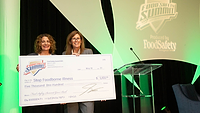Analysis of Raw Milk Cheeses as a Source of Foodborne Illness

The French Agency for Food, Environmental, and Occupational Health and Safety (ANSES) recently published a report on the main bacterial hazards associated with dairy products made from raw milk and various raw milk cheeses. ANSES conducted an assessment to identify which types of cheeses are most responsible for foodborne illnesses and should, therefore, be prioritized in public health efforts to control microbiological contamination. Raw milk cheeses are a source of concern for French officials as, over the last decade, 34 percent, 37 percent, and 60 percent of Salmonella, Listeria, and Escherichia coli infections were caused by raw milk cheese consumption, respectively.
Raw milk cheeses that were identified as the main sources of bacterial hazards are:
- Soft cheeses with a surface mold (e.g., Camembert, Brie, Crottin)
- Short-ripened, uncooked, pressed cheeses (e.g., Morbier, Reblochon, Saint-Nectaire)
- Soft-washed rind cheeses (e.g., Munster, Maroilles).
ANSES also studied existing efforts to control microbiological risks in the cattle, sheep, and goat dairy industries. At the farming and production stages, good hygiene practices were observed and will be maintained. However, at the consumer level, ANSES asserts that it is essential to comply with temperature-storing information and use-by dates on the packaging of raw milk dairy products, and cautions vulnerable populations against eating raw milk cheeses.
Although the raw milk dairy industry has demonstrated a commitment to combatting the microbiological hazards of its products with good hygiene practices and self-checks, ANSES recognizes there is room for improvement. The next step of its assessment will be to identify methods to further reduce bacterial risks, such as improving epidemiological investigations, identifying poor hygiene practices at an earlier stage, and improving consumer communication.
Looking for a reprint of this article?
From high-res PDFs to custom plaques, order your copy today!






